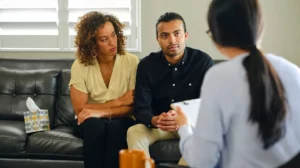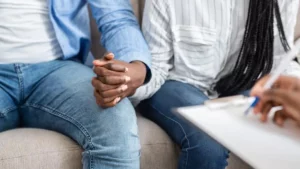In the intricate essences of relationships, some paths inevitably lead to separation. When the once harmonious bond begins to unravel, navigating the emotional complexities can be overwhelming. Enter uncoupling counseling a powerful tool that guides individuals through the process of consciously and compassionately ending a romantic partnership. In this blog post, we will explore the world of uncoupling counseling, its purpose, benefits, and how it can provide invaluable support.
Contents
What Is Uncoupling Counseling?
 Uncoupling counseling goes beyond simply facilitating the process of ending a relationship. It delves deeper into the emotional and psychological aspects of separation. This form of counseling recognizes that the end of a relationship can be a complex and transformative experience, filled with grief, anger, confusion, and a myriad of other emotions.
Uncoupling counseling goes beyond simply facilitating the process of ending a relationship. It delves deeper into the emotional and psychological aspects of separation. This form of counseling recognizes that the end of a relationship can be a complex and transformative experience, filled with grief, anger, confusion, and a myriad of other emotions.
The counselor provides guidance and support as clients navigate their emotions, helping them gain a deeper understanding of themselves and the dynamics that led to the end of the relationship. Additionally, uncoupling counseling assists individuals in developing effective coping strategies to manage the emotional upheaval associated with separation. This may involve learning healthy communication techniques, setting boundaries, and finding ways to prioritize self-care during this challenging period.
Why Uncoupling Counseling Matters
 Uncoupling counseling matters for several compelling reasons:
Uncoupling counseling matters for several compelling reasons:
- Emotional Support: Ending a romantic relationship or marriage can be emotionally challenging, often accompanied by feelings of grief, anger, confusion, and loss. Uncoupling counseling provides individuals with a supportive space to process these emotions, explore their thoughts, and work through the complexities of separation.
- Healthy Coping Strategies: Uncoupling counseling equips individuals with effective coping strategies to navigate the emotional upheaval associated with separation. Through counseling, individuals can learn healthy communication techniques, develop self-care practices, and establish boundaries to manage their emotions constructively. These skills are invaluable not only during the separation but also in future relationships and personal growth.
- Clarity and Understanding: Uncoupling counseling helps individuals gain a deeper understanding of themselves and the dynamics that contributed to the end of their relationship. It offers an opportunity for self-reflection, exploring patterns, and identifying areas for personal growth. This newfound insight can pave the way for healthier future relationships.
- Co-Parenting Support: For individuals with children, uncoupling counseling provides essential guidance on navigating the complexities of co-parenting after separation. Counselors can help develop effective communication strategies, establish cooperative parenting plans, and address potential conflicts, ensuring that the well-being of the children remains a priority.
- Legal and Practical Guidance: Uncoupling counseling often provides individuals with valuable information on the legal and practical aspects of separation. Counselors can offer guidance on legal processes, financial considerations, and available resources, empowering individuals to make informed decisions and navigate the logistical challenges of ending a relationship.
How Is Uncoupling Counseling Delivered?
Uncoupling counseling can be delivered through various modalities, depending on the preferences and circumstances of the individuals seeking support. Here are some common delivery methods:
Individual Counseling
Individual counseling, also known as one-on-one therapy, is a therapeutic approach where a trained counselor or therapist works directly with an individual client. It provides a confidential and supportive space for the client to explore their thoughts, emotions, and challenges, with the goal of gaining insight, developing coping strategies, and promoting personal growth and well-being.
Couples Counseling
If both individuals are open to it, couples counseling can be a valuable avenue for navigating the uncoupling process. This format involves both partners attending counseling sessions together, with the guidance of a trained therapist. The counselor helps facilitate open communication, addresses underlying issues and supports the couple in reaching agreements and making decisions regarding the separation.
Group Counseling
It provides a supportive environment where individuals going through similar experiences can connect, share their stories, and gain insights from one another. Group sessions are facilitated by a counselor who provides guidance, facilitates discussions, and offers therapeutic interventions to help group members process their emotions and gain perspective.
Online Counseling
With the advancement of technology, uncoupling counseling can be delivered through online platforms. Through video conferencing or messaging services, individuals can engage in counseling sessions from the comfort of their own homes. Online counseling offers convenience, accessibility, and flexibility for those with busy schedules or limited access to in-person counseling services.
Workshops and Support Programs
Workshops and support programs are structured group settings that offer education, guidance, and support for individuals facing similar challenges or seeking personal growth. Led by trained professionals, these programs provide a platform for learning practical skills, sharing experiences, and connecting with others. They often focus on specific topics or themes and offer a supportive environment.
Considerations To Choose A Right Uncoupling Counselor
When choosing a counselor to help with the process of uncoupling, there are several considerations to keep in mind.
Here are some important factors to consider in order to select the right uncoupling counselor:
- Specialization and Experience: Look for a counselor who specializes in divorce or uncoupling counseling. They should have experience working specifically with individuals and couples going through separation or divorce. This specialization ensures that they have the necessary expertise to address the unique challenges that arise during the uncoupling process.
- Qualifications and Credentials: Check the counselor’s qualifications and credentials. They should have appropriate education and training in counseling, psychology, or a related field. Additionally, ensure that they are licensed or certified by a reputable professional organization or licensing board.
- Personal Compatibility: It’s important to feel comfortable and at ease with your counselor. Building trust and establishing a good rapport is crucial for effective therapy. Schedule an initial consultation or phone call to gauge if you feel a connection with the counselor and if they create a safe and non-judgmental space for you to share your concerns.
- Recommendations and Reviews: Seek recommendations from trusted sources, such as friends, family, or other professionals. You can also search online for reviews and testimonials to get an idea of others’ experiences with the counselor.
- Consultation: Consider scheduling an initial consultation or session with the counselor before committing to a long-term therapeutic relationship. This allows you to assess their style, ask questions, and discuss your goals and expectations for the uncoupling counseling process.
Remember, finding the right uncoupling counselor is a personal decision. Take your time, do thorough research, and trust your instincts to choose a counselor who can provide the support and guidance you need during this challenging time.
Conclusion
In conclusion, uncoupling counseling serves as a guiding light during the challenging journey of separation. Through emotional support, clarity, and effective coping strategies. It empowers individuals to navigate the complexities of ending a relationship with resilience and personal growth. Addressing emotional, practical, and co-parenting aspects, helps individuals find healing. That makes informed decisions and builds healthier futures. The utilization of various therapeutic approaches offers a pathway toward understanding and acceptance. Along with the potential for a brighter and more fulfilling post-separation life.
Addressing and resolving couple of issues is essential for a strong and lasting partnership. If you have any queries regarding Online Couple Counseling experienced therapists at CoupleMantra can help. Book a trial couple therapy session.



